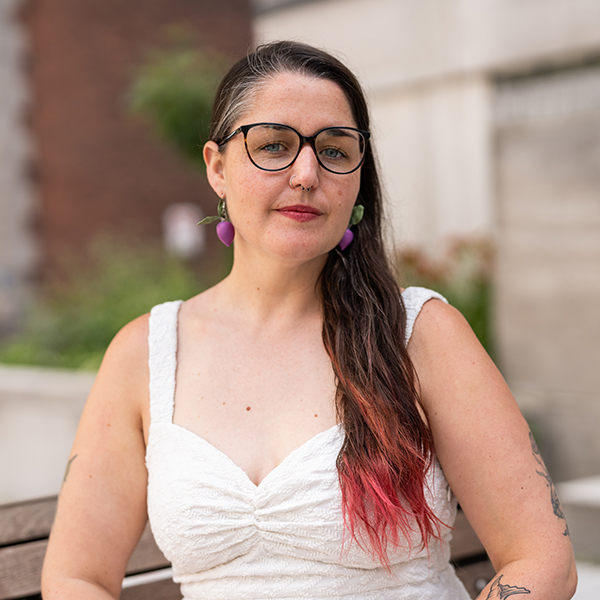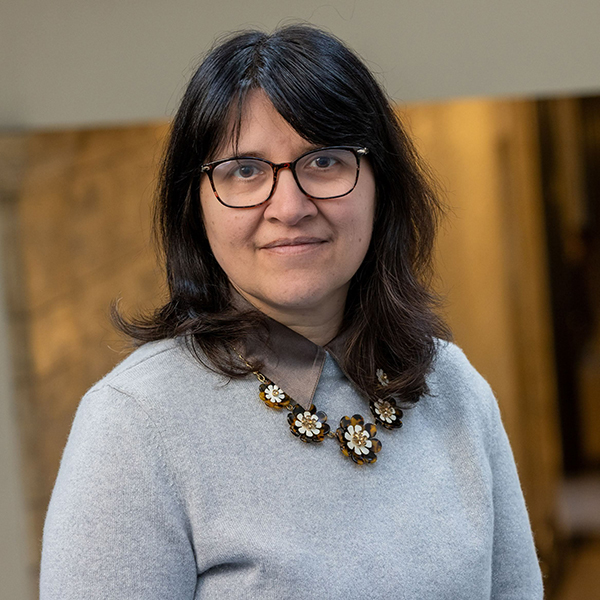The ancient epic of the siege of Troy, exposing the cruelty of war and gods, is unspooling serially at a downtown bar.
In a feat that is epic in itself, Lynn Kozak is memorizing, translating, rehearsing and performing consecutive nearly hour-long chunks of The Iliad every Monday evening at Bar des Pins. The associate professor of classical studies’ bid to explore how to effectively present The Iliad for a contemporary audience should take roughly 30 weeks. This is Homer as it feels right to be witnessed: in a communal space, live and told grippingly by a single orator.“
I hope anybody who comes, regardless of their familiarity with the story, can have a good time for an hour,” says Kozak about the project, known as Happy Hour Homer. “I hope that it’s entertaining, I hope that the story is clear. Even though it is a little chunk of the story, every week has its own story to tell. And I hope people have fun.”
Clearly, people are having fun. Kozak has been spotting regulars in the audience. “That’s the thing I’m most excited about, seeing the community that’s formed around it.”
Each week features a different director, and the staging and concepts vary wildly. Sometimes beer bottles on the pool table illustrate battle plans. The bar itself becomes Troy’s rampart walls to be sat on. One week presents Kozak as a kid excitedly telling the tale, waving sparkly props, riding a wooden rocking horse. Another episode has Kozak as a femme fatale under interrogation. Each time, Kozak inhabits the characters poignantly and humorously, using language ranging from the familiar “rosy-fingered dawn” and “swift-footed Achilles” to more contemporary “buck up” and “pissed off,” breaking out of character occasionally to explain someone’s ancestry or to remind us that a hecatomb is a sacrifice of 100 oxen.
Kozak works from the original Greek, going over the text on Tuesdays, picking up where the last show left off. “People have been arguing for literally millennia on where the story should be broken up,” Kozak says. The director choice and time constraint (a digestible 45 minutes to an hour) sets the boundaries, with each week encompassing roughly 500 lines. Wednesdays, Kozak reads through the text with the director, then rehearses for five hours Thursday through Sunday. Funding from the Fonds de recherche du Québec – Société et culture supports the work of the directors as well that of stage manager and project assistant Alex Martalogu, BA’15, MA’18.
Each director brings different specialties and approaches to the project – the emphasis in any given performance could be on language, character work, or dramatic technique – so Kozak continually benefits from working with a collaborator offering a fresh eye.
The performances are filmed and posted on YouTube. By transcribing and editing the videos, Kozak plans to produce an annotated translation – possibly the first ever – that is based on a performance rather than for a performance. The classics scholar finds most translations of Homer’s work to be out-of-date and frustratingly inaccessible. “You almost have to translate from the translation, because so many of the English words that are given are almost obsolete.”
Kozak is updating many of the terms that are used. For instance, “greaves” is hardly a word that modern audiences are familiar with, so Kozak’s Acheans sport “very nice shin guards.” It isn’t meant to be glib or to elicit giggles, but to respond to “a real desire for clarity in the narrative.” Kozak admires translations that adhere to the poetry and meter of the ancient Greek. “I’ve consistently said that The Iliad should be done by a really awesome freestyle rapper.”
While indisputably a classic, Homer’s work is deeply problematic in many ways, says Kozak. “I have a deep love of The Iliad, but I’m also keenly aware it’s a story about a lot of awful men in an awful culture doing awful things to one another and to women all around them. It’s not easy embodying these characters and talking about women being given as prizes along with tripods and horses… And I think about colonial structures, and the problem of what it means to perform The Iliad on unceded [Indigenous] territory.”
Still, Kozak sees so much literary value in The Iliad, from its profound contemplation of death, violence and loss, to its exploration of how we choose to live, to its moving moments of positivity and kindness. “If universities stopped to function tomorrow, I’m pretty sure that The Iliad would survive. There’s something in it for everyone.”
Visit here to find out more about Happy Hour Homer. Performances take place on Mondays at 6 pm at Bar des Pins at 3714 Avenue du Parc.


